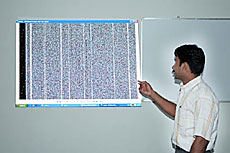Let's hope the Republicans can finally see the value of net neutrality. I was pleased to hear AT&T capitulate to it in order for the BellSouth deal to go through. It would be almost hilarious some of the things our elected officials spouted off during the last debate if it wasn't for the fact that they were our elected officials. This is not a no worry debate about an issue that will never affect us. This will reach into every home in the US that uses the internet. It is a prime example of Congress listening to huge companies on how they can make more money without talking to the people whose tax dollars made the internet possible. I am all for a free and open market which is what net neutrality is trying to protect. The internet is not owned by the company at the end of the pipeline. Comcast deciding what you will and will not be able to see based upon who has paid them is not free and open. Remember, this has nothing to do with bandwidth. Companies that use a lot of bandwidth pay for that bandwidth. This is all about the end of the information chain and companies like Comcast wanting to control what gets to your desktop.
Net neutrality push expected to resume in Congress
By Anne Broache
Staff Writer, CNET News.com
The nation's soon-to-be largest telephone company may have caved to certain Net neutrality commitments for the sake of a merger blessing, but a renewed push for more sweeping rules could return to Capitol Hill as soon as this month.
Breaking months of partisan deadlock among the four voting members of the Federal Communications Commission over AT&T's roughly $86 billion union with BellSouth, the telecommunications giant made a last-minute pledge last week to abide by a series of antidiscrimination principles supported by Internet content companies like Google and eBay, and consumer advocacy groups.
Although some FCC commissioners have asserted that the agreement is not a public policy mandate, it could serve as a blueprint for members of Congress preparing to reintroduce bills intended to bar network operators like AT&T from charging extra fees to content providers for added perks.
"The agreement once and for all puts to rest the bogus argument that no one can define Net neutrality," said Ben Scott, policy director for the advocacy group Free Press, which coordinates a pro-Net neutrality coalition called Save the Internet.
Net neutrality is the idea that network operators such as AT&T and Verizon should be prohibited from prioritizing any content or services that travel across their pipes. Ever since telecommunications executives began warning more than a year ago that they should have the right to charge extra for premium placement on their networks, Internet companies and consumer groups have been clamoring for federal regulations barring such a practice. They argue that it threatens users' freedoms. Opponents of regulations say there's no evidence of a discrimination problem and that new rules would stifle innovation.
Specifically, AT&T said that for 30 months after the merger's closure, it would not provide or sell "any service that privileges, degrades or prioritizes any packet" transmitted over its pipes based on its "source, ownership or destination."
That description amounts to a "framework for rules that can be applied industry-wide to allow American consumers and small businesses to benefit from deployment of discrimination-free advanced networks," U.S. Sen. Ron Wyden, D-Ore., said in an e-mailed statement on Tuesday.
Wyden, who authored the first and perhaps most aggressive Net neutrality bill to emerge last year, hopes to reintroduce his bill in similar form this January, according to an aide.
Also hoping for a late January or early February proposal are Sen. Olympia Snowe, R-Maine, and Sen. Byron Dorgan, D-N.D.
The duo teamed up in May to introduce the Internet Freedom Preservation Act, which barred network operators from making special deals with content providers and required them to offer all Internet material on an "equivalent" basis. The latest bill will likely undergo only "technical" changes, but the senators' staffs plan to discuss language of the AT&T-BellSouth concessions while finalizing their own, a Republican aide said.
On the House of Representatives side, Rep. Edward Markey, D-Mass., plans to reintroduce an identical version of his Network Neutrality Act, though a representative said a timetable had not been set yet. Markey, who is widely expected to be named the new chairman of a key Internet and telecommunications panel as early as this week, also plans to hold hearings on the topic throughout the spring and early summer.
Aside from outlawing any blocking or degrading of Internet content, Markey's bill would prohibit network operators from prioritizing certain content unless they offered similar priority to all content in that category. For instance, if a broadband company offers a dedicated pipe for its video offerings, it would have to make that venue available for all third-party video providers without a "surcharge."
With Democrats slated to become the majority in the House and, by a razor-thin margin, in the Senate when they reconvene in Washington this week, Net neutrality advocates have been hopeful that they will have more luck seeing their policy priorities translated into law.
Under a Republican Congress last year, calls for Net neutrality regulations faltered in both chambers. Republicans generally said they preferred to rely on market forces to solve any problems and were reluctant to pass what they considered to be preemptive laws.
AT&T's concessions, however, are no indication that the old battle lines--among large broadband companies on one hand and consumer groups and Internet content companies on the other--have evaporated. A Republican Senate aide said it was unclear whether more members on that side of the aisle would be swayed to support new regulations.
Tom Amontree, a senior vice president with the U.S. Telecom Association, which represents telephone companies of all sizes, said the lobbying group "has consistently maintained that government regulation of the Internet will hurt consumers and stifle the Internet as the free and dynamic force of innovation and economic growth that we count on today."
AT&T's concessions are limited to the BellSouth context and should not be viewed as any sort of policy reversal, said Jim Cicconi, AT&T's senior executive vice president for external and legislative affairs.
The compromise was necessary to win over a majority of commissioners on the merger question, and "we continue to believe that Net neutrality regulations are unwarranted and unwise," Cicconi said in a statement sent to CNET News.com on Tuesday.
Despite the appearance of a majority vote in favor of the merger, partisan battle lines over Net neutrality were also being solidified at the FCC level, leaving questions about how--or whether--the conditions would be enforced.
In a joint statement (click for PDF), Republican FCC Chairman Kevin Martin and Commissioner Deborah Taylor Tate again voiced their disdain for Net neutrality regulations, deeming that they are "simply not warranted by current market conditions and may deter facilities investment."
They went on to emphasize that the conditions may be enforceable in the AT&T and BellSouth situation, but would be in no way binding to future decisions by the FCC because only a minority of the commissioners--Democrats Michael Copps and Jonathan Adelstein--supported them.
"Thus, although AT&T may make a voluntary business decision, it cannot dictate or bind government policy," they wrote.
But Congress can--and should, urged Net neutrality advocates. The approach agreed to by AT&T in this context "is the right policy for all broadband Internet consumers," said Amazon.com's Paul Misener, a vice president of global public policy, "and we look forward to working with policymakers to ensure that it is applied throughout the United States."





